Verband der Antiquare Österreichs
Unique! The Max Morgenstern Collection, presented by Norbert Donhofer at the 54th Stuttgart Antiquarian Book Fair
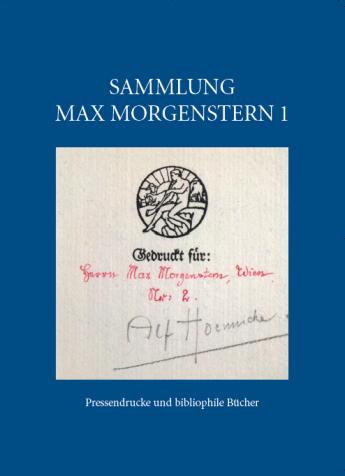
When the 54th Stuttgart Antiquarian Book Fair opens its doors to visitors from 23 to 25 January 2015, book lovers will have the rare opportunity to admire the highlights of a unique collection from the grand times of the Viennese “Belle Epoque”. In a series of two catalogues the Austrian rare book dealer Norbert Donhofer presents the library of Max Morgenstern (1883-1946) consisting of private press books, illustrated books, and precious bindings of the Wiener Werkstätte. Part 1 of this extraordinary gathering of bibliophile treasures – documented in a richly illustrated catalogue – will be on display at the Stuttgart Antiquarian Book Fair: one more reason not to miss the second oldest fair in the world!
Norbert Donhofer met John Morton, grandson to Max Morgenstern, in 2013. Since then he had been working on the Morgenstern collection and learned a lot about the life and the library of this Jewish collector from Vienna. He learned, for example, that Max Morgenstern was one of the best customers of the Wiener Werkstätte who sometimes rejected drafts for bindings (even those made by Josef Hoffmann) because he had the feeling that the binding would not fit to the content. Max Morgenstern belonged to a generation of famous Viennese bibliophiles who founded libraries with great knowledge, ultimate taste and a life-long passion. John Morton has written a biographical sketch of his grandfather who brought together one of the most fascinating libraries.
Max and Hertha Morgenstern – A biography by John Morton
Maximilian Morgenstern was born in 1883 in Mährisch-Weißkirchen and later served in the Austrian army during the 1914-18 war. His father, Alojzy, owned a textile mill in Bielsko- Biala in Poland, some 60 kilometres south of Katowice. However, he was a gambler and when Max inherited the firm it was somewhat run-down. But with hard work and skill Max managed to build it up to a world-renowned manufacturer of high-quality worsted cloth, winning gold medals at various international exhibitions.
In the early 1900s he began indulging a passion – assembling a library of private press books and luxury custom bindings (especially those of the Wiener Werkstätte). Among the private presses he most admired was the Doves Press (London, 1901-1909), then a printer of books of almost austere design but sublime elegance, which had a profound influence on German presses such as Ernst-Ludwig-Presse, Insel Verlag and Kleukens-Presse, all of which Max avidly collected along with many others. Eventually he built up a magnificent library of over 1500 books, many today rare as hen’s teeth.
Max’s literary tastes were wide and catholic, ranging from translations of the Greek classics, through Goethe and Heine, on to English writers like Shakespeare, Dickens and Wilde (Max was something of an Anglophile) and including contemporary writers such as the Austrians Hugo von Hofmannsthal and Arthur Schnitzler or the Belgian poet Emile Verhaeren. But he stopped collecting in about 1923, a year after he married Hertha Israel, a young woman born in Berlin in 1900; related to the Rothschilds but through her mother, meaning she could inherit none of the family wealth. Now a married man, with two sons to shortly follow, Max needed a family home to replace his bachelor residence. Eventually they settled on a large apartment in Wattmanngasse, Hiezing. But Vienna was too far from Bielsko for daily commuting – even today the train journey takes 5 1/2 hours – so during the week Max lived in a smaller apartment in Bielsko and returned to Wattmanngasse only for weekends.
But though Max spent so much time away from Vienna and his wife, life was good for the Morgensterns. The business prospered and, by the mid-1930s, the two sons were being educated in England. The couple obviously enjoyed entertaining on a grand style; the table in the Wattmangasse dining room could seat 18 guests. One can only imagine the glittering evenings with sumptuous food produced by Hertha’s cook for Vienna’s intelligentsia and artists gathered amidst Wiener Werkstätte furniture. As the guests sipped wine from elegant glasses designed by Josef Hoffman, Hertha presided over proceedings in a Wiener Werkstätte couture gown. The room would have been like a small art gallery with the work of different artists hanging from the walls, anything from August von Pettenkofen’s depictions of Hungarian gypsy and peasant life, to Johann Larwin’s lushly ripe paintings of flowers and fruit, to an Egon Schiele painting of an iris, to the dark, disturbing fantasies of Alfred Kubin and many others.
Since before 1914 Kubin had been a lifelong friend of Max who was probably his major patron; of 300 works in the first major exhibition of Kubin (1937, the Albertina), Max lent 64 items. One telling pen-and-ink work inscribed by Kubin in 1920 the artist depicts himself as a street musician with Max and Hertha as a fashionable couple who hand the musician a bank note. The collection also included a pair of formal portraits of the Fürst and Fürstin of Lichtenstein by Johann Baptist Lampi; since they don’t really ‘belong’ with the other artworks, it has been suggested that their inclusion in the collection was because Max or Hertha was distantly related to one of them; we’ll probably never know.
With such a lifestyle to support, small wonder Max had no money left to buy books after his marriage! But in 1938 everything changed when the black shroud of Anschluss snuffed out liberal and Jewish life in Austria.
The Morgensterns were lucky beyond imagination, with many good friends in England and enough money to help buy their freedom. While thousands of Austrian Jews would perish in the death camps, Max and Hertha managed to escape to England to join their sons; Hertha, tasked with sorting out affairs in Vienna, left on August 12, 1938, while Max, after ordering his affairs as best possible in Poland, left on September 18. Many of their possessions followed them to England, including large paintings and items of furniture. Possibly sensing that life would never be the same again, they did not take the huge dining table. Other items, including the Petenkofens and Lampis, were confiscated by Vugesta and never seen again. Max’s loyal personal assistant, Miss Kotschy, was not Jewish. Desperately and bravely she tried to protect his Polish property after 1939 but Max never saw anything again from Bielsko, neither the factory machinery, the cloth nor the books, furniture and artwork from his apartment. We know an Umsiedler, Herr Issert, appropriated the mill but it is unknown whether its contents and Max’s personal possessions were looted or destroyed by advancing Russian armies.
On arrival in England, Max and Hertha moved from hotels in London and Boars Hill, near Oxford, to eventually settle in Bradford, Yorkshire, the centre of British worsted manufacturing. But for their sons the outbreak of war meant internment on the Isle of Man, being deemed enemy aliens, along with many other Jews. When His Majesty’s Government decided they were not Nazi agents they were sent to Australia! Only repeated and frantic letters from Hertha to civil servants in London resulted in the two young men being returned to England, risking the Atlantic U-boat wolf-packs. Max attempted to revive his business in Bradford. But it was not to be. He had lost all his weaving machinery and although he tried weaving on other people’s looms the economics of production no longer made sense. Worst of all, he lost control of his most precious manufacturing asset – the quality that had earlier won him gold medals.
In 1946, two days before his first grandson (me, the author of this biography) was born, Max Morgenstern was killed in a road accident in a zero-visibility, suffocating smog.
Max is remembered as a kind, generous and extremely cultivated man with something of a wicked sense of humour. A favourite family anecdote has him on a train, no doubt en route to or from Bielsko, sitting opposite a sleeping fellow passenger whose suit was of a fine but unusual weave. Max was fascinated but could not analyse how it had been made. Unable to contain his curiosity, he took out his pair of pocket scissors and, very carefully so as not to awaken the man, snipped a postage-stamp sized piece of the cloth from the suit lining.
Hertha lived till 1962, never really adjusting to her adopted country but living a life that attempted to mirror her privileged life in pre-war Vienna; for example, her laundry went to London, some 330k away, and returned in wicker baskets, each immaculately pressed item separated by purple tissue paper. Hertha never learned to cook – there had always been servants to do that. She once offered me, as a child, iridescent ham and a boiled egg you could pour out of its shell.
Max’s elder son Peter, my father, was extremely reluctant to talk about family life in Vienna. Like so many Jews who survived the Holocaust, he probably suffered ‘survivor guilt’. Unfortunately, therefore, there are many gaps in what we can reconstruct of the Morgenstern’s life before 1938.
***
The biographical sketch has been published in Norbert Donhofer’s catalogue “The Max Morgenstern Collection I - Private Press Books”, it is presented here by permission of the author and Norbert Donhofer. Pictures: from the catalogue
Norbert Donhofer: The Max Morgenstern Collection I - Private Press Books
>>> Click here to browse the catalogue
54th Stuttgart Antiquarian Book Fair
23 to 25 January 2015 - Württembergischer Kunstverein
Schlossplatz 2, Stuttgart, GERMANY
Opening hours: Friday 11 am to 7.30 pm, Saturday and Sunday 11 am to 6 pm
>>> Click here for more information
>>> Browse the book fair catalogue
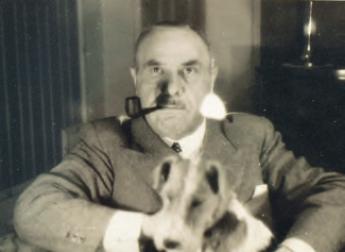
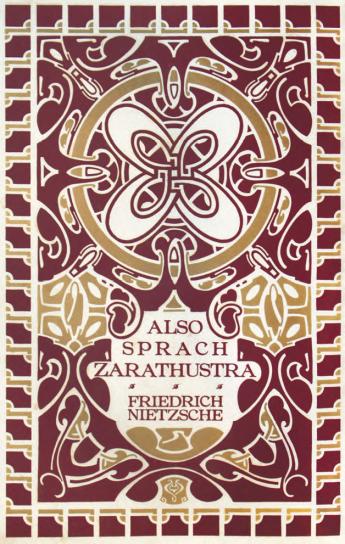
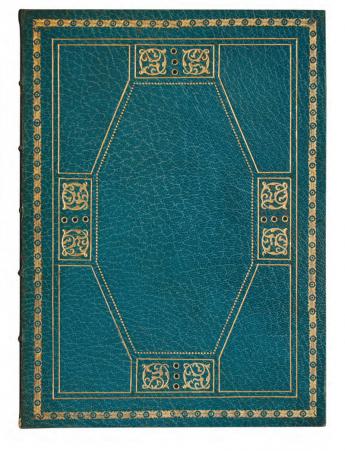
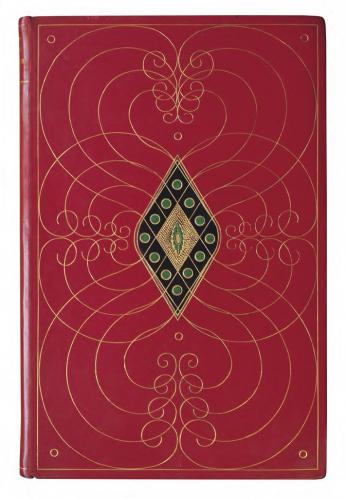
- Documents Associées
- Documentation center files 1523 donhofer 20morgenstern 20web
